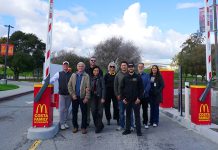
The push to mandate coronavirus vaccinations amid sharply rising caseloads nationwide accelerated Monday, as the country’s most populous state and its largest city both announced that they would require hundreds of thousands of government workers to get inoculations or face weekly testing.
At the same time, the Department of Veterans Affairs became the first federal agency to require such vaccinations, by announcing that all 115,000 of its frontline health care workers must receive a coronavirus inoculation in the next two months or face possible termination.
The actions by Gov. Gavin Newsom in California and Mayor Bill de Blasio in New York City reflected growing concern among many government officials that vaccine skepticism and the spread of the more contagious delta variant could lead to a new wave of the pandemic. Their orders would cover hundreds of thousands of government employees and, in the case of California, the more than 2 million health care workers in private and public hospitals, nursing homes and other congregate-care facilities, according to the state Department of Health.
New cases per day have risen fourfold in the U.S. over the past month, leading some public health experts to call for stricter measures to increase lagging vaccination rates.
A group of nearly 60 major medical organizations, including the American Medical Association and the American Nurses Association, also issued a statement Monday calling for mandatory vaccination of health care workers.
“Unfortunately, many health care and long-term care personnel remain unvaccinated,” the statement said. “As we move toward full FDA approval of the currently available vaccines, all health care workers should get vaccinated for their own health, and to protect their colleagues, families, residents of long-term care facilities and patients.”
Yet the logistical challenges of implementing these mandates or anything stronger became apparent quickly in New York City when several major unions representing city workers warned that the rules had to be collectively bargained.
“New York City is a union town and that cannot be ignored,” said Henry Garrido, the executive director of one of the unions, District Council 37, which has 150,000 members, the largest of any representing city employees.
In California, the new rules were generally welcomed by health care organizations and the public employee unions, who helped elect Newsom in 2018. The California Nurses Association, which represents 100,000 nurses, did not directly address Newsom’s order, but said that all eligible people should be vaccinated, “while respecting the need for medical and religious accommodations.”
The new requirement in California, which covers 246,000 state government employees, plus the 2 million health care workers in the public and private sectors, will begin Aug. 2 and be implemented by Aug. 23, Newsom said.
“We are exhausted by the right-wing echo chamber that has been perpetuating misinformation around the vaccine and its efficacy and safety,” Newsom, a Democrat, said. “We are exhausted by its politicization of this pandemic, and that includes mask wearing that has been equated to the Holocaust. It’s disgraceful, it’s unconscionable and it needs to be called out.”
California averages almost 6,400 new virus cases per day, an increase of more than 200% in the past two weeks. More than 64% of adults in the state are fully vaccinated, according to federal data.
Last month, San Francisco announced that all of its workers, more than 35,000 people, would have to receive a vaccine or risk disciplinary action after FDA approval of at least one of the three vaccines now being administered under an emergency order. Several Bay Area counties, Stanford University and the 10 campuses of the University of California have also recently announced some type of mandate to help improve stalling vaccination rates.
The order in New York City, affecting roughly 340,000 city workers, including teachers and police officers, would begin for most workers Sept. 13, the day when nearly 1 million students in the nation’s largest school district return to class. De Blasio has signaled that school reopening is critical to the city’s recovery from the pandemic.
“September is the pivot point of the recovery,” de Blasio said Monday, also referring to the number of workers who are scheduled to return to offices in Manhattan.
The Biden administration has said it is not the federal government’s role to impose a nationwide mandate. But for the Department of Veterans Affairs, the risk to veterans, who tend to be older, sicker and possibly more vulnerable to illness, was becoming too great, Denis McDonough, the secretary of veterans affairs, said Monday.
“I am doing this because it’s the best way to keep our veterans safe, full stop,” said McDonough, whose department is one of the largest federal employers.
Doctors, dentists, registered nurses, physician assistants and some specialists in the sprawling VA system will, starting Wednesday, have eight weeks to get fully vaccinated or face penalties including possible removal, he said. About 70% of workers in department health care centers have been fully vaccinated.
In California, the SF Bar Owner Alliance, an industry group representing 500 bars, said Monday that its members would require customers to show proof of vaccination or a negative virus test in order to enter an establishment. Those who do not have either would have to sit in outside spaces, the group said.
On Monday, de Blasio reiterated a call he made last week to private employers to set vaccine mandates for their workers.
“Right now, what we’re saying is we’re leading by example,” he said. “A lot of times, private sector employers say that’s what they need.”
But de Blasio’s call to action has yet to show results, with surveys suggesting that mostly smaller businesses are requiring their employees to get vaccinated.
Facebook, which has 4,000 employees in New York, for instance, said Monday that it would continue to encourage, rather than require, coronavirus vaccines for workers.
A press officer for JPMorgan Chase, which employs about 20,100 people in New York City, declined to comment on de Blasio’s remarks. But last month, the bank’s chief executive, Jamie Dimon, warned employees in a memo that the company “may mandate that all employees receive a COVID-19 vaccination consistent with legal requirements and medical or religious accommodations.”
Private health care companies by and large have also not moved toward requiring their workers to receive shots, with only NewYork-Presbyterian issuing a vaccine mandate, which will begin in September.
A month ago, it seemed unlikely that anything could threaten New York City’s bounce back from the pandemic, as restaurants, stores and offices had all been allowed to reopen without restrictions. But recently, the number of virus cases in the city has surged, to more than 1,000 per day on some days, the most since May, which officials attribute to the spread of the more contagious delta variant.
While nearly 5 million New Yorkers have received at least one dose of the vaccine, the speed of inoculations has slowed. Two million adult New Yorkers are still unvaccinated.
Some health experts are concerned that the city’s new rules amount to a testing mandate, not a vaccination mandate, and they are urging the mayor to take more aggressive steps. Weekly testing, experts have said, is not a strong control measure for the highly infectious variant.
Dr. Sheldon Landesman, an infectious disease specialist and professor at SUNY Downstate, called on the city to move forward with a full vaccination mandate for employees and indoor masking for all.
“This thing is spreading like wildfire again in the city,” Landesman said. “The city has not really done its job on this.”
At a news conference Monday, Gov. Andrew M. Cuomo avoided supporting a statewide measure like Newsom’s and argued most “public-facing” employees are municipal, not state workers, suggesting mandates were more of a question for localities.
De Blasio said the new measures were first steps and that more would follow.
He could face opposition from the city’s more than two dozen municipal unions. The president of one paramedics’ union, FDNY EMS Local 2507, which has 4,300 members, said Monday that it opposed the new measures, which he said needed to be collectively bargained.
“The city and the mayor cannot simply disregard the civil liberties of the workforce,” the president, Oren Barzilay, said in a statement.
But the United Federation of Teachers said it was on board with the new rules. New York City’s largest police union, the Police Benevolent Association, declined to comment.
New York City officials are hoping that the new rules will mitigate anxieties among parents who kept their children learning from home over the past year and are still wary of the return to classrooms. De Blasio has insisted that New York City’s schools will reopen in September as planned, with no remote option.
The city’s Education Department estimates that around 60% of its employees are vaccinated, which is around the same rate as for employees in public hospitals.
Vaccination rates appear to be even lower in the Police Department, which says it has administered the vaccine to 43% of its service members, though the rate is likely higher when including officers who got vaccinated on their own.
This article originally appeared in The New York Times.
Copyright 2021 The New York Times Company














